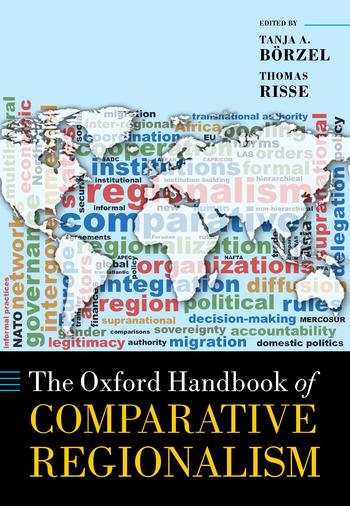Book Publication: “Oxford Handbook of Comparative Regionalism”
Dec 03, 2015
The Oxford Handbook of Comparative Regionalism
Image Credit: Oxford University Press Link
The KFG is pleased to announce the publication of the “Oxford Handbook of Comparative Regionalism”, co-edited by the KFG directors Tanja A. Börzel and Thomas Risse. The edited volume will be out in time for the International Studies Association Annual Conference taking place in Atlanta, Georgia, on 3-6 March, 2016. The Handbook – the first of its kind – assembles leading scholars to take stock of a research field located at the interface of area studies, comparative politics, and international relations. It is a volume testifying to the strength and promise of comparative regionalism.
The Handbook offers a unique systematic and comprehensive survey of the scholarship on regionalism, regionalization, and regional governance. In twenty-seven chapters, the authors synthesize the state of the art, provide a guide to the comparative study of regionalism, and identify future avenues of research. Particular attention is devoted to the emergence and effects of regionalism, the institutional design of regional organizations and issue-specific governance regimes, and the relationship between regionalism and regionalization.
Three findings of the Handbook are especially important: First, while the number of regional organizations did not sharply rise since the end of the Cold War, the editors argue that particularly multi-purpose ROs were since bestowed with new tasks and have further moved towards (deeper) regional integration. Second, existing theories of cooperation and integration provide plausible accounts for the emergence of regionalism, whereas diffusion and normative emulation of what regional actors and states consider appropriate offer more convincing accounts with regard to institutional designs. Third, regionalism seems to have positive consequences for peace and security and domestic “regime-boosting” effects, both by locking in democratic reforms and by stabilizing autocratic rules.
Contributing authors are Tanja A. Börzel, Thomas Risse, Fredrick Söderbaum, Etel Solingen and Joshua Malnight, Amitav Acharya, Francesco Duina, Andrea C. Bianculli, Frank Schimmelfennig, Kathleen J. Hancock and Alexander Libman, Anja Jetschke and Saori N. Katada, Morten Vanbjorn, Christof Hartmann, Arie M. Kacowicz and Galia Press-Barnathan, Soo Yeon Kim and Edward Mansfield and Helen V. Milner, Kathleen R. McNamara, Laszlo Bruszt and Stefano Palestini, Anna van der Vleuten, Peter M. Haas, Sandra Lavenex, Flavia Jurje, Terri E. Givens and Ross Buchanan, Jon Pevehouse, Tobias Lenz and Gary Marks, Karen J. Alter and Liesbet Hooghe, Jeffrey T. Checkel, Berthold Rittberger and Philipp Schroeder, and Andrea Ribeiro Hoffmann.
For more information on the book, the editors and authors, please refer to the publisher’s website.
The editors and authors are taking the volume on tour to discuss the findings with experts from the world regions. This October, as Soo Yeon Kim has written in this newsletter, six authors and the editors presented their chapters at the National University of Singapore, to a group of colleagues from India, China, Japan, Korea, Indonesia and Australia. This coming April, a similar event will take place at Pontifical Catholic University of Rio de Janeiro, hosted by Andrea Ribeiro Hoffmann, and the tour will close with an event in South Africa in November 2016.
